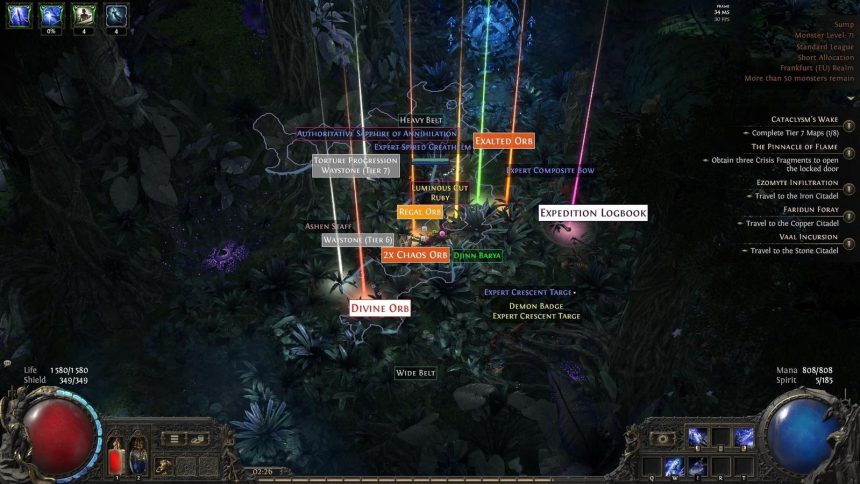Path of Exile 2’s early access has provided a thrilling, yet challenging experience, prompting a shift from a level 88 Ranger to a level 45 Monk due to several key issues within the endgame content. While the game offers engaging gameplay, certain aspects detract from the overall enjoyment, particularly concerning death penalties, frustrating gameplay mechanics, inefficient resource management, unbalanced loot systems, and excessively demanding challenges.
The current “one death, all progress lost” system in endgame maps proves excessively punishing. While consequences for death are expected, losing map progress, Waystones, map modifiers, and a percentage of experience simultaneously feels disproportionately harsh. This system doesn’t necessarily increase the challenge but instead amplifies frustration, especially when coupled with unfair death scenarios. Rather than promoting skillful play, it often leads to a sense of annoyance and discouragement, detracting from the overall experience. A more balanced approach to death penalties is needed to maintain a challenging yet rewarding endgame.
Further exacerbating the frustration are the various unfair death scenarios present within maps. While Grinding Gear Games has addressed some of the more egregious instances, issues persist with in-map events that overwhelm players with masses of enemies, often leading to instant deaths due to unread elite modifiers and unfavorable map geometry. Combining these unpredictable events with the one-portal death mechanic creates a frustrating experience, especially when facing challenging bosses with instant-kill mechanics. A single misstep can result in significant losses, further highlighting the need for a more forgiving system that rewards strategic play rather than punishing minor errors.
Waystone management also presents a tedious and unenjoyable aspect of the gameplay loop. Even with optimized Atlas tree upgrades, managing Waystones feels like a chore. Players are forced into restrictive strategies, saving high-tier Waystones solely for boss maps to avoid wasting them on lower-tier maps with a lower chance of yielding equivalent replacements. The current system, despite promising a “300% increased Waystone chance,” often results in lower-tier Waystones, forcing players to rely on trading or endure repetitive grinding to maintain an adequate supply. This reliance on trading contradicts the desire for a self-sufficient gameplay experience, further emphasizing the need for a more streamlined and less restrictive Waystone system.
The current loot system, heavily reliant on Magic Find gear, creates an unbalanced and somewhat monotonous meta. While build diversity exists, the overwhelming focus on stacking Magic Find overshadows other aspects of character progression and build crafting. Speed and efficiency become secondary to sheer loot quantity, as players with higher Magic Find values reap significantly greater rewards regardless of their clear speed. This creates an arms race for Magic Find gear, potentially diminishing the value of diverse builds and playstyles. Addressing this imbalance requires a careful re-evaluation of the loot system, perhaps drawing inspiration from previous iterations of Path of Exile that successfully mitigated similar issues.
The Ascendancy Trials, particularly the second pair required for final skill points, present an excessively demanding and frustrating challenge. Their length, compounded by stacking negative modifiers and the unforgiving one-death failure condition, results in a disproportionately high time investment for each attempt. Failing a lengthy trial after a significant time investment leads to immense frustration, discouraging repeated attempts. These trials demand a substantial rework to align with a more reasonable difficulty curve, ensuring a challenging yet rewarding experience rather than a tedious and discouraging hurdle.
Despite these significant drawbacks, Path of Exile 2’s early access offers an undeniably engaging and enjoyable core gameplay experience. The decision to switch characters rather than abandon the game entirely speaks volumes about the underlying appeal. However, addressing the aforementioned issues is crucial for the game’s long-term success. The current endgame systems, while intended to be challenging, often border on frustrating due to their punishing nature and reliance on tedious mechanics. A more balanced approach that rewards skillful play while mitigating unnecessary frustration is essential for creating a truly rewarding and engaging endgame experience. Balancing challenge with enjoyment is key to retaining players and fostering a thriving community. The developers must carefully consider these issues and implement necessary changes to ensure a more balanced and rewarding endgame experience.



